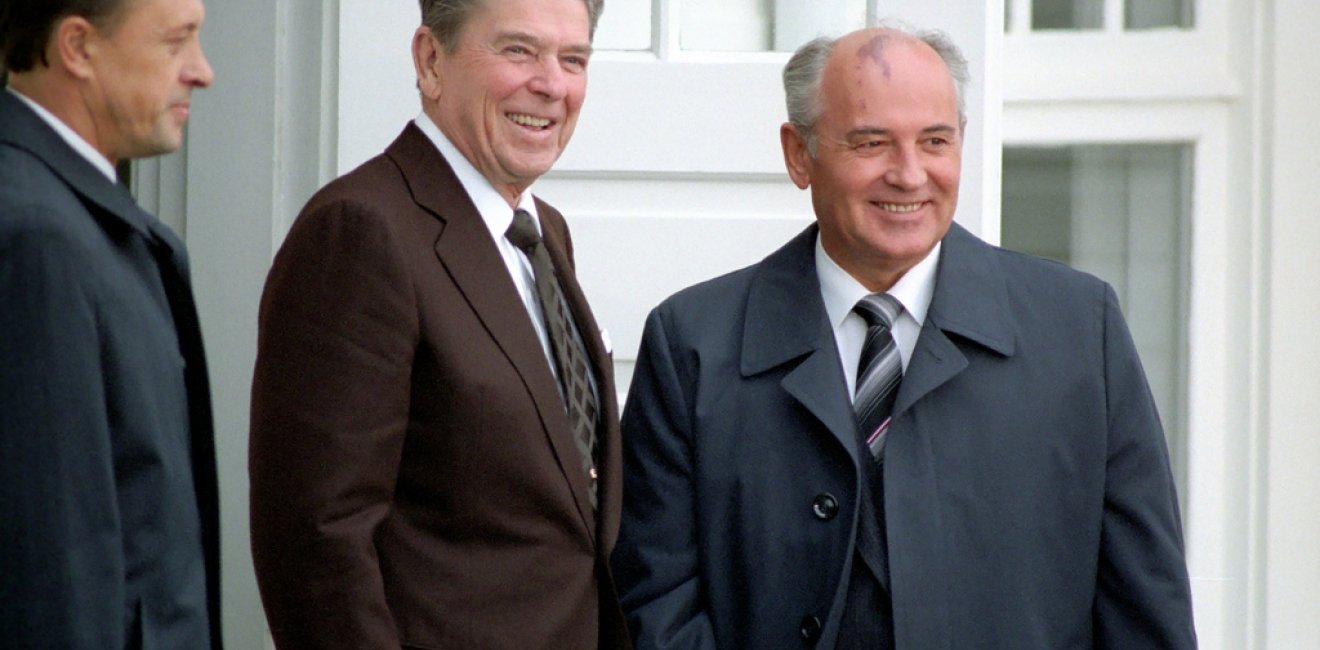
A blog of the Kennan Institute
BY PAVEL KOSHKIN
The lack of political dialogue between Moscow and Washington today has clear consequences even beyond the current harsh confrontations and sanctions war affecting the two powers’ ties. This was one of the conclusions of the June 4 roundtable “Overcoming the Cold War” in Moscow, dedicated to the thirtieth anniversary of the meeting between the Soviet leader Mikhail Gorbachev and his American counterpart, President Ronald Reagan.
Organized by the Gorbachev Foundation and the Wilson Center’s Kennan Institute in cooperation with the Institute of U.S. and Canadian Studies of the Russian Academy of Sciences (ISKRAN) and the Russian State University for the Humanities (RSUH), the roundtable brought together well-known Russian and American experts and diplomats to discuss the current stalemate in relations. Among the participants were the former U.S. ambassador to the Soviet Union Jack Matlock, the U.S. embassy’s Thomas Leary, the RSUH’s Victoria I. Zhuravleva, ISKRAN’s Sergey Rogov and Valery Garbuzov, Rutgers University’s David Foglesong, and MGIMO University’s Vladimir Pechatnov.
Here are five key takeaways from the roundtable.
1. The logic of a zero-sum game doesn’t work on review of the Cold War
One of the key problems in U.S.-Russia relations dates back to the late 1980s and the early 1990s, when the Soviet Union collapsed and Washington started seeing itself as the only winner of the Cold War. America’s superiority complex and Russia’s inferiority complex contributed to the gradual growth of misunderstanding, which turned into a grave relationship crisis in 2014 over events in Ukraine.
According to Vladimir Pechatnov, professor of American studies at MGIMO, America tacitly recognized its triumph in the Cold War when President George H. W. Bush broke his promise to Gorbachev that NATO would not expand eastward. But according to Gorbachev, who sent a written address to the gathering, the collapse of the Soviet Union should not be seen as America’s triumph; it was a victory shared by Moscow and Washington. Jack Matlock, former American ambassador to the Soviet Union, also dismissed the “myth [that] the West won the cold war.… Nonsense. Everybody won,” he said.
2. The new cold war is more dangerous than the previous one
Today, Russia and the United States are effectively engaged in a new cold war, one no less dangerous than Cold War I, believes ISKRAN’s academic director Sergey Rogov. The current cold war is not the same: there is no ideological confrontation or a nuclear arms race between Moscow and Washington. Nevertheless, certain characteristics of the new cold war could make it more dangerous than the last one.
The first matter of very serious concern is the replacement of strategic analysis in Russian and American decision-making with large-scale propaganda efforts. Gorbachev and Reagan destroyed the image of each other’s country as the enemy in 1985–1991, yet modern politicians seem bent on restoring reciprocal animosity. What is most concerning is that they start believing their own propaganda, warns Rogov.
A second matter of equally grave concern is that the lack of political dialogue impairs U.S.-Russia relations, such that any contact with Putin is viewed almost as state treason. This is not normal, argues Rogov.
Third, the sanctions war undermines trust and the spirit of cooperation. To overcome a new cold war, both sides should avoid imposing sanctions on each other, wrote Gorbachev in his address to the participants of the roundtable.
Finally, even as Trump plans to increase the U.S. military and nuclear budget to more than $700 billion and Russia has embarked on modernizing its nuclear arsenal, Moscow and Washington haven’t talked seriously about nuclear proliferation since 2012. Having forgotten about the threat of a nuclear war, they have brought themselves to the verge a new arms race, said Rogov. It will take years to resume dialogue in this sphere and prevent the risks of spreading nuclear weapons globally, he said.
3. People-to-people contacts bring positive shifts in U.S.-Russia relations
Both Russians and Americans strongly believe that citizen diplomacy can alleviate the confrontation in the long run. Thomas Leary, minister counselor for public affairs at the U.S. embassy in Moscow, said that people-to-people contacts are most important in promoting mutual understanding.
Fortunately, there are some outstanding examples in the history of U.S.-Russia relations. Gorbachev and Reagan gave the green light to people-to-people contacts during the 1985 meeting in Geneva. They met there as human beings and established a personal chemistry that turned into trust, noted Pechatnov. He quoted passages from Gorbachev’s diaries in which the Soviet leader prioritized personal contacts between Soviets and Americans.
Reagan and Gorbachev were “keenly” interested in promoting citizen diplomacy, which gave a boost to the 1985–1991 policy of perestroika, marked by a growing interest among ordinary Russians and Americans in their counterparts, Rutgers University’s David Foglesong pointed out.
One of the most successful examples of people-to-people contacts was the grassroots exchange program “Soviets, Meet Middle America,” founded in 1988 by the Center for U.S./U.S.S.R Initiatives (now the Center for Citizens Initiatives), a San Francisco–based organization. Under this program, about 400 citizens of the USSR visited hundreds of American cities, staying in private homes and occasionally being interviewed by American journalists. After their return to the Soviet Union, they became cultural ambassadors and, to cite Foglesong, debunked negative myths about each other that had arisen during the Cold War.
Another example of people-to-people contact lies in the academic realm. The Russian Academy of Sciences and the U.S. National Academy of Sciences recently finished a report on possible U.S.-Russia cooperation in the sphere of anti-ballistic missile systems, said Vladimir Dvorkin, a participant in the June 4 roundtable and a chief researcher at the Primakov National Research Institute of World Economy and International Relations (IMEMO). This cooperation is occurring despite increasing differences between Russia and the United States over U.S. missile systems in Europe and the looming arms race between the two countries.
4. Empathy, not sympathy, should come first in bilateral relations
People-to-people contacts and grassroots initiatives are good tools for fostering empathy and the ability to put oneself on someone’s shoes. This quality is lacking among the major political players in Moscow and Washington today. Instead, driven by sympathies, the U.S. and Russian leadership are fueling tensions between the countries. Experts should take the leading role in creating bridges between Russia and the United States through empathy, because they understand nuances and details and could have an impact on policy-making in their countries, according to both Pechatnov and Victoria Zhuravleva of the Russian State University for the Humanities.
As long as there is no dialogue between authorities, it is vitally important to maintain one at the grassroots level to prevent hostility and foster empathy between ordinary Russians and Americans. That will make it easier to restore ties between the political elites if and when they resume cooperation, said Valery Garbuzov, director of the Institute of U.S. and Canadian Studies.
5. The U.S-Russia confrontation won’t be alleviated in the near future
Although people-to-people contact and personal chemistry between leaders could partly restore U.S.-Russia ties, they won’t resolve the fundamental problems that led to the deep crisis in Moscow-Washington relations. Realistically, the Kremlin and the White House won’t see eye-to-eye anytime in the near future.
For such congruence to eventuate, two basic conditions will have to be met: the United States will have to see Russia as an equal stakeholder in the global arena, and Russia will have to stop challenging the United States and its liberal democratic order. In practice, Washington tries to contain Russia and keeps viewing it as a global troublemaker and challenger that undermines liberal order and democracy in the world, while Moscow tries to prove that the United States is not the only player in town.
Garbuzov described the status quo as a new Russian revisionism and a new American containment. He finds today’s crisis in Moscow-Washington relations reminiscent of the situation surrounding the Soviet collapse. We can’t expect friendship in a time of confrontation, but it is possible to craft the means for controlling confrontation within a framework of pragmatic cooperation, as was the case during the Cold War, Garbuzov said. “There was a mechanism that regulated the confrontation, but today we don’t have it, and this is dangerous in the nuclear era,” he concluded.
Author


Kennan Institute
After more than 50 years as a vital part of the Wilson Center legacy, the Kennan Institute has become an independent think tank. You can find the current website for the Kennan Institute at kennaninstitute.org. Please look for future announcements about partnership activities between the Wilson Center and the Kennan Institute at Wilson Center Press Room. The Kennan Institute is the premier US center for advanced research on Eurasia and the oldest and largest regional program at the Woodrow Wilson International Center for Scholars. The Kennan Institute is committed to improving American understanding of Russia, Ukraine, Central Asia, the South Caucasus, and the surrounding region through research and exchange. Read more

Explore More in The Russia File
Browse The Russia File
Chechnya as a Model of Modern Russia

Russia’s Indigenous Communities and the War in Ukraine

Gas and Power in a Changing US–Russia Relationship

